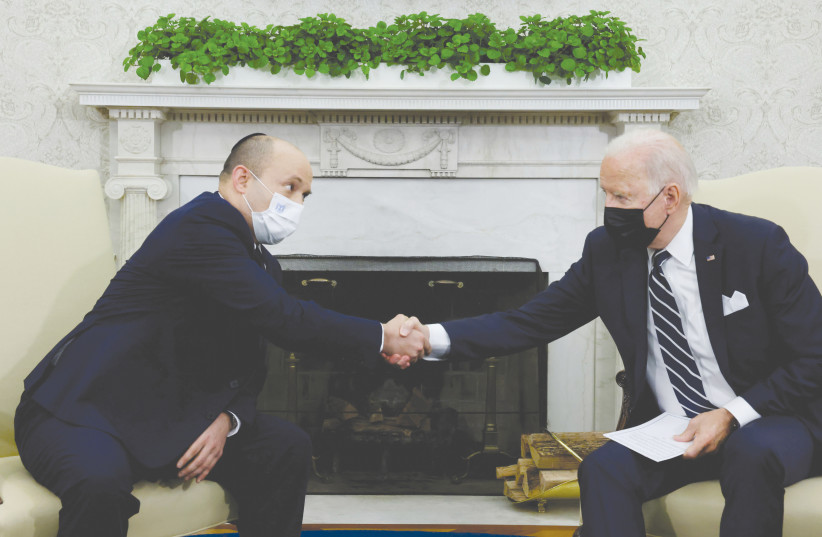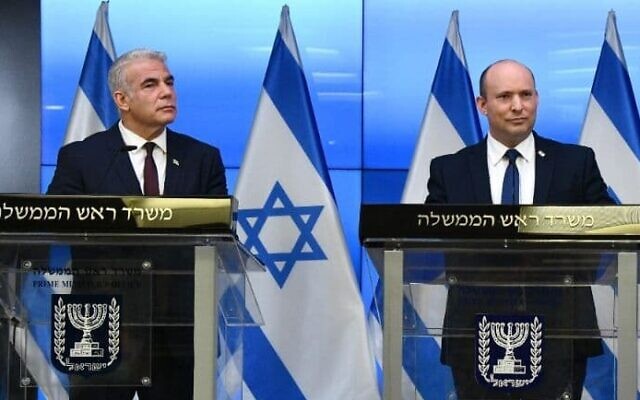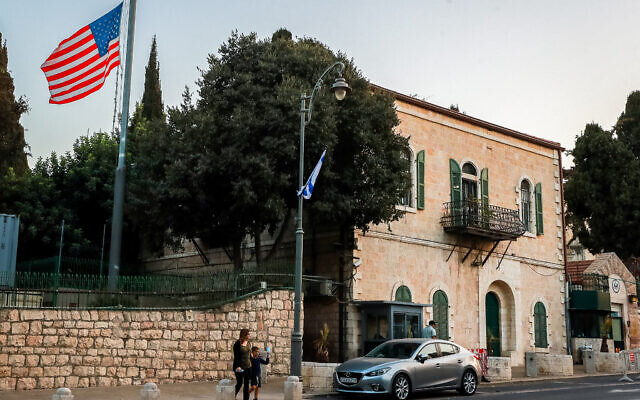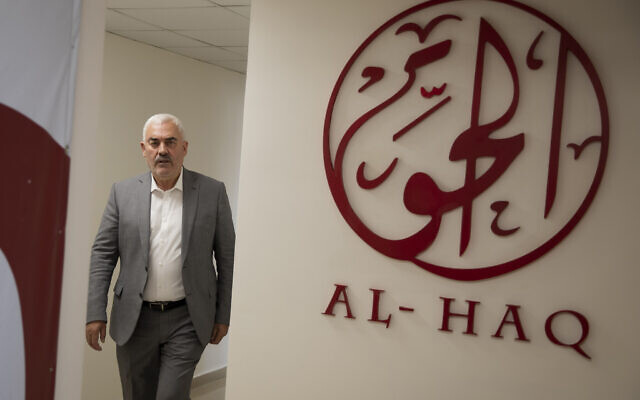ZIONIST APARTHEID IN ACTION
Bennett: There’s no room in Jerusalem for a US consulate for PalestiniansThe Biden administration has promised the PA it will reopen the consulate-general but has to make good on that pledge.
JERUSALEM POST
NOVEMBER 6, 2021

US PRESIDENT Joe Biden and Prime Minister Naftali Bennett shake hands during a meeting at the White House in August.
(photo credit: JONATHAN ERNST / REUTERS)
Israel has told the Biden administration that it is opposed to any plan to reopen the US consulate-general that services the Palestinians in Jerusalem because the city is the undivided capital of the Jewish state, Prime Minister Naftali Bennett told reporters on Saturday night.
“My position, which has been presented to the Americans by myself and by Foreign Minister Lapid, is that there is no place for an American consulate that serves the Palestinians in Jerusalem,” Bennett said.
“We have expressed our position [to the US] determinedly, quietly, without drama, and I hope it will be understood. Jerusalem is the capital of Israel alone.”
Lapid backed up Bennett, saying that “sovereignty in Jerusalem [belongs] to one country, the State of Israel,” and that “this is a principled stance of the State of Israel to the opening of a consulate in Jerusalem.”
The issue here is Jerusalem and not a consulate for the Palestinians, Lapid stressed, adding that the US was welcome to open a consulate for the Palestinians in Ramallah.
NOVEMBER 6, 2021

US PRESIDENT Joe Biden and Prime Minister Naftali Bennett shake hands during a meeting at the White House in August.
(photo credit: JONATHAN ERNST / REUTERS)
Israel has told the Biden administration that it is opposed to any plan to reopen the US consulate-general that services the Palestinians in Jerusalem because the city is the undivided capital of the Jewish state, Prime Minister Naftali Bennett told reporters on Saturday night.
“My position, which has been presented to the Americans by myself and by Foreign Minister Lapid, is that there is no place for an American consulate that serves the Palestinians in Jerusalem,” Bennett said.
“We have expressed our position [to the US] determinedly, quietly, without drama, and I hope it will be understood. Jerusalem is the capital of Israel alone.”
Lapid backed up Bennett, saying that “sovereignty in Jerusalem [belongs] to one country, the State of Israel,” and that “this is a principled stance of the State of Israel to the opening of a consulate in Jerusalem.”
The issue here is Jerusalem and not a consulate for the Palestinians, Lapid stressed, adding that the US was welcome to open a consulate for the Palestinians in Ramallah.

A coalition of organizations who oppose the Biden Administration's intent to reopen a US consulate for Palestinians in Jerusalem held a vigil in Jerusalem.
(credit: Courtesy)
Former President Donald Trump in 2019 had closed the long-standing US consulate-general in Jerusalem that serviced the Palestinians and acted as a de-facto embassy to the Palestinian Authority. It had provided a direct line between the PA and Washington. Its services were merged with those of the US Embassy, which was relocated from Tel Aviv to Jerusalem in 2018.
The Biden administration has promised the PA it will reopen the consulate-general but has not yet made good on that pledge or even provided a date for such an opening.
It had been expected that the US would only push forward with the matter once the government had successfully approved its budget on Thursday.
It is presumed that this issue will be a growing point of tension between Jerusalem and Washington, along with continued settlement activity which the Biden administration frowns upon.
It’s as if the US would need Israel’s approval to reopen the consulate, even though the building itself exists and the change is solely on the policy level.
Bennett downplayed the significance of Israeli opposition to American plans to reopen the consulate-general.
“There is so much more that we agree upon with our American friends, than we disagree upon,” he said.
Bennett and Lapid spoke as Senior Advisor for Global Energy Security Amos Hochstein is due to visit Israel and the Palestinian territories on Sunday and Monday. He will meet with senior Israeli and Palestinian senior officials to discuss energy security. Hochstein will also discuss maritime negotiations with Israeli officials.
In addition to Hochstein’s arrival, Colombian President Ivan Duque will land in Israel on Sunday for a three-day visit.
On Tuesday he will open a trade and innovation office in Jerusalem that will be a satellite of its Tel Aviv office. The move is a nod to Colombian recognition of Israeli sovereignty over its capital city.
Former President Donald Trump in 2019 had closed the long-standing US consulate-general in Jerusalem that serviced the Palestinians and acted as a de-facto embassy to the Palestinian Authority. It had provided a direct line between the PA and Washington. Its services were merged with those of the US Embassy, which was relocated from Tel Aviv to Jerusalem in 2018.
The Biden administration has promised the PA it will reopen the consulate-general but has not yet made good on that pledge or even provided a date for such an opening.
It had been expected that the US would only push forward with the matter once the government had successfully approved its budget on Thursday.
It is presumed that this issue will be a growing point of tension between Jerusalem and Washington, along with continued settlement activity which the Biden administration frowns upon.
It’s as if the US would need Israel’s approval to reopen the consulate, even though the building itself exists and the change is solely on the policy level.
Bennett downplayed the significance of Israeli opposition to American plans to reopen the consulate-general.
“There is so much more that we agree upon with our American friends, than we disagree upon,” he said.
Bennett and Lapid spoke as Senior Advisor for Global Energy Security Amos Hochstein is due to visit Israel and the Palestinian territories on Sunday and Monday. He will meet with senior Israeli and Palestinian senior officials to discuss energy security. Hochstein will also discuss maritime negotiations with Israeli officials.
In addition to Hochstein’s arrival, Colombian President Ivan Duque will land in Israel on Sunday for a three-day visit.
On Tuesday he will open a trade and innovation office in Jerusalem that will be a satellite of its Tel Aviv office. The move is a nod to Colombian recognition of Israeli sovereignty over its capital city.
Bennett, Lapid in united front: ‘No place for US consulate in Jerusalem’
Foreign minister says Washington welcome to open mission to Palestinians in Ramallah if it wishes; believes there is ‘understanding’ in US toward blacklisting of rights groups
By TOI STAFF

Prime Minister Naftali Bennett (right) and Foreign Minister Yair Lapid speak at a press conference in Jerusalem, on November 6, 2021. (Haim Zach/GPO)
Prime Minister Naftali Bennett and Foreign Minister Yair Lapid presented a united front Saturday in their opposition to the United States reopening its consulate for the Palestinians in Jerusalem.
Speaking to the media after the approval of the state budget for 2021-2022, the prime minister said that “there is no place for an American consulate that serves the Palestinians in Jerusalem.” This had been conveyed to Washington “both by myself and by Foreign Minister Yair Lapid,” he said.
“We are expressing our position consistently, quietly and without drama, and I hope it is understood. Jerusalem is the capital of Israel alone.
Lapid backed Bennett up, saying that “If the Americans want to open a consulate in Ramallah we have no problem with that.” But “sovereignty in Jerusalem belongs to one country — Israel.”
Lapid rejected the notion that with the government more stable following the budget’s passing, the leaders may be more willing to take on such a politically touchy subject.
“It’s not a question of politics. It’s an Israeli objection on principle for opening a consulate in Jerusalem. There’s an American embassy [here].”
Late last month, a senior official in the US State Department told senators that Israel’s permission would be required before the US could reopen its consulate in Jerusalem serving Palestinians.
US President Joe Biden has pledged to reopen the consulate, but the issue has been a sticking point between Israel and the US, as well as among some members of Congress. The consulate was shuttered by then-US president Donald Trump in 2019 and its staff was folded into the US embassy — which had been moved from Tel Aviv to Jerusalem a year earlier — in what the Palestinians view as a downgrading of their ties with the US.
ADVERTISEMENT

View of the US Consulate building in Jerusalem, on October 27, 2021, currently serving the US Embassy. (Yonatan Sindel/Flash90)
Asked about the issue during a press conference alongside Lapid in Washington two weeks ago, US Secretary of State Antony Blinken reiterated the Biden administration’s intention to proceed with the plan. “As I said in May, we’ll be moving forward with the process of opening a consulate as part of deepening those ties with the Palestinians,” he said.
Behind closed doors, Lapid reportedly warned Blinken that such a move could risk toppling the coalition government.
Lapid was also asked Saturday about the contradictory claims coming from Israel and the US as to whether Jerusalem had notified Washington in advance of its move to blacklist half a dozen Palestinian human rights organizations for alleged terror ties, a step that was taken last month.
Israel has alleged the groups effectively operate as an arm for the Popular Front for the Liberation of Palestine terror group — a claim to which the international community has reacted with skepticism.
The foreign minister once again maintained that the Americans had been notified, saying there had been “a process of evidence gathering” for several months that the State Department had been updated on. “It’s incorrect that they were not told,” he said.
This contradicted comments by US State Department spokesman Ned Price.

Shawan Jabarin, director of the al-Haq human rights group, at the organization’s offices in the West Bank city of Ramallah, on Saturday, October 23, 2021. (AP Photo/Majdi Mohammed, File)
“I understand some things were said just after the announcement,” Lapid said, “but in general we are on the same page with the Americans, they’re aware of it. Representatives of the Foreign Ministry were in Congress and the Senate in the past week to present the materials to the Senators and congressman on the various panels. I believe there is an understanding toward this step and the intelligence behind it.”
Amy Spiro and Jacob Magid contributed to this report.
Foreign minister says Washington welcome to open mission to Palestinians in Ramallah if it wishes; believes there is ‘understanding’ in US toward blacklisting of rights groups
By TOI STAFF

Prime Minister Naftali Bennett (right) and Foreign Minister Yair Lapid speak at a press conference in Jerusalem, on November 6, 2021. (Haim Zach/GPO)
Prime Minister Naftali Bennett and Foreign Minister Yair Lapid presented a united front Saturday in their opposition to the United States reopening its consulate for the Palestinians in Jerusalem.
Speaking to the media after the approval of the state budget for 2021-2022, the prime minister said that “there is no place for an American consulate that serves the Palestinians in Jerusalem.” This had been conveyed to Washington “both by myself and by Foreign Minister Yair Lapid,” he said.
“We are expressing our position consistently, quietly and without drama, and I hope it is understood. Jerusalem is the capital of Israel alone.
Lapid backed Bennett up, saying that “If the Americans want to open a consulate in Ramallah we have no problem with that.” But “sovereignty in Jerusalem belongs to one country — Israel.”
Lapid rejected the notion that with the government more stable following the budget’s passing, the leaders may be more willing to take on such a politically touchy subject.
“It’s not a question of politics. It’s an Israeli objection on principle for opening a consulate in Jerusalem. There’s an American embassy [here].”
Late last month, a senior official in the US State Department told senators that Israel’s permission would be required before the US could reopen its consulate in Jerusalem serving Palestinians.
US President Joe Biden has pledged to reopen the consulate, but the issue has been a sticking point between Israel and the US, as well as among some members of Congress. The consulate was shuttered by then-US president Donald Trump in 2019 and its staff was folded into the US embassy — which had been moved from Tel Aviv to Jerusalem a year earlier — in what the Palestinians view as a downgrading of their ties with the US.
ADVERTISEMENT

View of the US Consulate building in Jerusalem, on October 27, 2021, currently serving the US Embassy. (Yonatan Sindel/Flash90)
Asked about the issue during a press conference alongside Lapid in Washington two weeks ago, US Secretary of State Antony Blinken reiterated the Biden administration’s intention to proceed with the plan. “As I said in May, we’ll be moving forward with the process of opening a consulate as part of deepening those ties with the Palestinians,” he said.
Behind closed doors, Lapid reportedly warned Blinken that such a move could risk toppling the coalition government.
Lapid was also asked Saturday about the contradictory claims coming from Israel and the US as to whether Jerusalem had notified Washington in advance of its move to blacklist half a dozen Palestinian human rights organizations for alleged terror ties, a step that was taken last month.
Israel has alleged the groups effectively operate as an arm for the Popular Front for the Liberation of Palestine terror group — a claim to which the international community has reacted with skepticism.
The foreign minister once again maintained that the Americans had been notified, saying there had been “a process of evidence gathering” for several months that the State Department had been updated on. “It’s incorrect that they were not told,” he said.
This contradicted comments by US State Department spokesman Ned Price.

Shawan Jabarin, director of the al-Haq human rights group, at the organization’s offices in the West Bank city of Ramallah, on Saturday, October 23, 2021. (AP Photo/Majdi Mohammed, File)
“I understand some things were said just after the announcement,” Lapid said, “but in general we are on the same page with the Americans, they’re aware of it. Representatives of the Foreign Ministry were in Congress and the Senate in the past week to present the materials to the Senators and congressman on the various panels. I believe there is an understanding toward this step and the intelligence behind it.”
Amy Spiro and Jacob Magid contributed to this report.
No comments:
Post a Comment